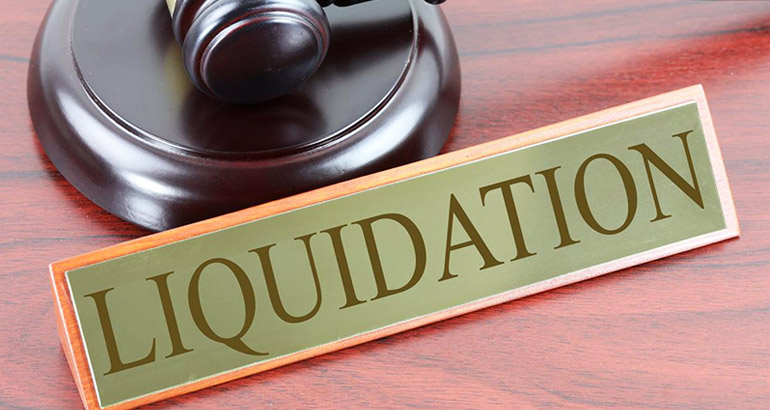Company Liquidation Things To Know Before You Get This
Company Liquidation Things To Know Before You Get This
Blog Article
Some Of Company Liquidation
Table of ContentsThe Best Guide To Company LiquidationCompany Liquidation Fundamentals Explained10 Simple Techniques For Company LiquidationSee This Report about Company LiquidationFascination About Company LiquidationThe 3-Minute Rule for Company Liquidation
As soon as in progress, a CVL is under the efficient control of the creditors, who can designate a liquidator of their selection. Company Liquidation. At this stage, the function of the directors is ended. The Creditors Voluntary Liquidation process is utilized when a firm has come to the end of its beneficial lifeUltimately it is the directors that start the process in a Creditors Voluntary Liquidation. The supervisors will formally solve that the company can not proceed to trade because of its debts, and they assign an Accredited Insolvency Professional as the liquidators who prepares a statement of events to be provided to the financial institutions.
Whilst in the financial distress phase, it is still feasible to restructure and turn points around if assistance is hired promptly enough, as our shows. However, if things do not boost, then distress develops into a situation, and that is when the business's financial debt the money that it owes to its creditors go to a degree which means that liquidation is the only genuine alternative.
The Ultimate Guide To Company Liquidation
Our role is to supervise an organized liquidation prior to we liquify it. For even more details, assistance and guidance about a Creditors Voluntary Liquidation, please The first assessment is FREE.
An obligatory business liquidation (or compulsory ending up) is set up by an order made by the court, usually on the petition of a creditor, the firm or a shareholder. There are a number of feasible factors for making a winding-up order. One of the most typical is because the firm is financially troubled.
In a mandatory liquidation the feature of a liquidator is in a lot of cases at first done by an official called the. The Authorities Receiver is a police officer of the court and a member of the Bankruptcy Solution, an executive firm within the In most compulsory liquidations, the Official Receiver comes to be the liquidator instantly on the making of the winding-up order.
Company Liquidation Things To Know Before You Get This
This occurs either at a conference of financial institutions assembled for the purpose or directly by the Assistant of State. Where a bankruptcy expert is not appointed the Official Receiver remains liquidator. Where a compulsory liquidation follows immediately on from an, the court may designate the former administrator to act as liquidator.

Your restricted business might be liquidated (wound up) if it can not pay people or organisations it owes cash to (its financial institutions). When your firm owes money the lenders may attempt to recoup the financial debt by providing a main request for payment, called a statutory need.
The court releases a winding-up order if it decides your company can not pay its financial debts and is bankrupt. They will take control of the company and its properties.
Company Liquidation Can Be Fun For Everyone
You and any other of the firm's directors must co-operate with the liquidator. You can be outlawed from being a director for as much as 15 years or prosecuted if you have actually stopped working to execute your duties as a supervisor or damaged the legislation.
The firm liquidation process approaches browsing a lengthy and winding road in the dark there are possible dead ends and check over here stumbling blocks around every edge. That is, unless you have an insolvency specialist in your corner to assist light the means. The start of the liquidation procedure signifies the start of the end of a business as a lawful entity.

Company Liquidation - The Facts
From exploring optimal options, the obstacles you could deal with, and the crossroads you can anticipate to be awaiting you once the process is complete. Firm liquidation is the process of closing down a restricted business with the aid of an assigned Insolvency Manager - Company Liquidation, additionally referred to as a liquidator. The liquidator is brought into the business to 'wind up' all recurring affairs until, at the end of the process, the company is brought to a close.
Most of the time, HMRC will certainly be the major financial institution due to unsettled taxes such as Corporation Tax Obligation, BARREL, Pay As You Gain (PAYE) or National Insurance Coverage Contributions (NIC). Trade lenders, such as providers, will certainly likewise be able to act if they think they are not likely to be paid what they are owed.
If this takes place, it is crucial that you act promptly as time is running out to conserve your firm. Must there be no reaction to the Winding Up Application within seven days of it being issued, your firm will certainly then be sent out an Ending up Order to compel you to shut.
Some Known Facts About Company Liquidation.
They will chat you with my sources every one of the alternatives readily available to you and suggest what they think is the most effective strategy for you to take. A MVL can be asked for if your company is solvent however you still wish to close it down. It is one of the most preferred option with local business owner as it is the most tax-efficient means to stop trading.
Report this page